About Faculty
Faculty of Engineering, Dayalbagh Educational Institute, which is widely recognized as one of the most prestigious engineering institutions of India, was founded by His Holiness Param Guru Huzur Mehtaji Maharaj in 1950 as Dayalbagh Engineering College in response to the country's needs for trained technical manpower. It became a part of the Dayalbagh Educational Institute (Deemed University) in the year 1981.The Faculty has held aloft the beacon of knowledge, research and education in the field of engineering throughout its existence. Its innovative and comprehensive scheme of education aims at excellence but not at the cost of relevance, encourages initiative and creative work, which is inter-disciplinary and which prepares the student for the increasingly techno-oriented society of tomorrow. The mission objective of the value oriented educational system is to evolve a "Complete Man", i.e., a well rounded person whose hallmarks are intellectual strength, emotional maturity, truthfulness, general awareness, devotion to duty, high moral character, simple living, scientific temperament and societal commitment.
The faculty has taken a leading role in continuously upgrading its infrastructure, curriculum etc. to provide to state-of-the art education to students. The Faculty has two departments Electrical Engineering and Mechanical Engineering that offer a number of programmes at the undergraduate, postgraduate and doctoral levels .
Some highlights of the Faculty are -
- Recognized by AICTE and UGC. Government funded.
- low fee
- No Capitation Fee.
- High staff to student ratio (1:2.5).
- Highly qualified, experienced and dedicated Faculty.
- Excellent performance in GATE every year.
- Nearly 100% student placement.
- Several R&D projects sponsored by AICTE, DST, UGC.
- International Collaboration.
Novel Features
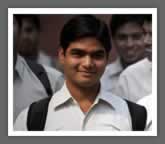
- Value Oriented Education System: To evolve a "complete man" with well-rounded personality.
-
Design Oriented Teaching: To emphasize design methodology and practical design process by including several project courses.
-
Exposure to Practical Field: Curriculum includes Practical Training, Industrial visits, Work Experience Courses, and Major projects.
Read more: Novel Features
History
 1950
1950
Dayalbagh Engineering College, Dayalbagh, Agra established as the first private Engineering College in India post-Independence, affiliated to Agra University, Agra, offering:
B.Sc. (Engineering) degree in Electrical and Mechanical Engineering disciplines.
1952
College buildings comprising of Main Building and Workshop complex constructed to house-
- Carpentry, Smithy, Molding and Machine shops
- Heat Engines and Hydraulic Machines Laboratories
- Electronics & Telecommunications Laboratories
- Applied Sciences Laboratories

1961
Laboratory building constructed to house Electrical Machines Laboratory and Material Testing Laboratory
1973
Engineering College became DEI Engineering College, one of three constituent colleges of the Dayalbagh Educational Institute (DEI) founded by Most Revered Dr. M. B. Lal Sahab as its Founder Director
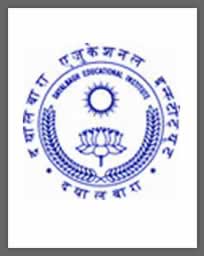
1981
Dayalbagh Educational Institute (Deemed University) was established and the erstwhile DEI Engineering College became the DEI Faculty of Engineering
Computer Center established
1984
Research Programme leading to Ph. D. degrees in Electrical and Mechanical Engineering disciplines introduced
1985
Additional laboratories setup in the laboratory building to house-
- Microprocessors & Power Electronics Laboratories
- Metrology Laboratory
- Heat Transfer Laboratory
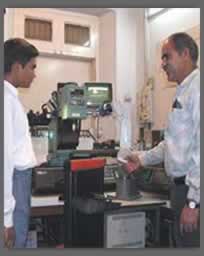 1987
1987
CNC Laboratory setup with a Flexible Manufacturing Cell equipped with CNC Lathe, CNC Milling Machine and a Mitsubishi Trainer Robot
1990
Part-time M. Tech. Programme in Engineering Systems introduced
1991
Biomedical Engineering Lab equipped with sate-of-the-art Bio-medical equipment established
Organized National Seminar on Industrial Engineering & Management (NSIEM-91)
1992
Full-time M. Tech. Programme in Engineering Systems introduced
1994
Educational Technology Lab was setup with state-of-the-art Multimedia Facilities
Hosted National Systems Conference (NSC-94)
1996
Organized National Seminar on Neural Networks and Fuzzy Logic Application in Manufacturing (NENFAM-96)
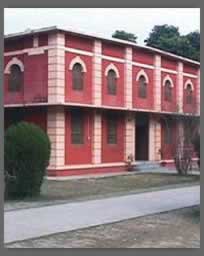 2000
2000
New Faculty Library building was constructed
Organized National Seminar on Applied Systems Engineering and Soft Computing, SASESC-2000
2002
Organized National Seminar on Emerging Convergent Technologies and Systems (SECTAS-2002)
2003
Organized a Symposium on Ethics and Moral Values (SEWA-03) for students
2004
Organized a series of seven workshops on "Seminar on Ethics and Values" (SEVA-SAT)
2005
Soft Computing (with Linux Cluster) and Image Processing Laboratories established
2006
Advanced Computing Laboratory with state-of-the-art computers established
2007
Launching of New Programmes
- B.Sc.Engg. Electrical with specialization in Electronics & Communications)
- B.Sc.Engg. (Electrical with specialization in Computer Science)
- B.Sc.Engg. (Mechanical with specialization in Industrial Engineering)
- B.Sc.Engg. (Mechanical with specialization in Computer Science)
- Five Year Integrated B.Sc. Engg. & M.Tech.
- Five-Year Integrated B.Sc. Engg. & M.B.A. in collaboration with the Faculty of Social Sciences
- Seven-Year Integrated B.Sc. Engg., M.Tech. & Ph.D.
2008
- Lateral Entry to B.Sc. (Engg.) for girls from Diploma in Electronics Engineering stream, DEI Technical College.
- Setting up of State-of-the-art e-classrooms in the faculty to offer quality technical education in the distance mode.
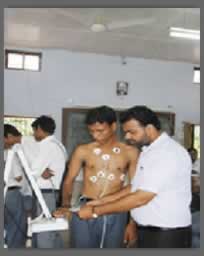 2010
2010
Establishment of a number of new labs including Computer Science Labs( Computer Networks Lab, Image Processing Lab and Advanced Programming Lab), Industrial Engineering Lab, Industrial Kinesiology Lab, Work Science Lab and SQC Lab.
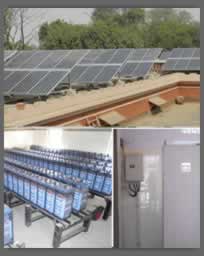 2011
2011
Installation of 150 KWP Solar Electric Power Plant in the Faculty
Strengths

-
Interdisciplinary approach of Education: Through courses offered by the departments of Physics & Computer Science, Mathematics, Bio-Sciences, Humanities and Management.
-
Infrastructure: Includes state-of-the-art equipment in all the laboratories and workshops, computing facilities, library and book -bank .
-
Multiuse of Facilities: Through inter-faculty resource sharing.
Read more: Strengths
Copyright @ Dayalbagh Educational Institute (Deemed to be University)
